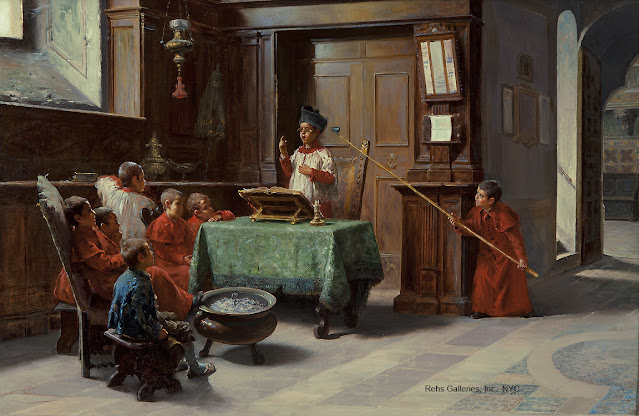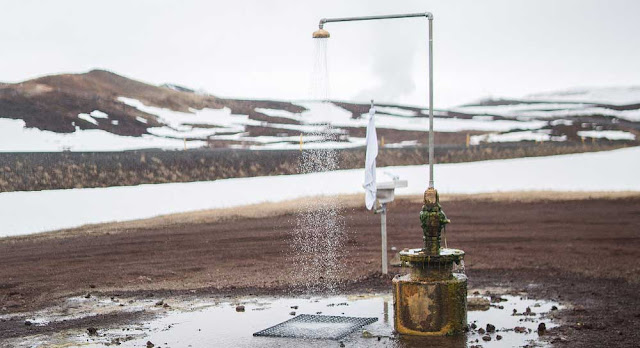Passing on the Altar Boy's Torch
It is a fine Sunday morning and my wife, children, and I are at a traditional Latin Mass many miles from our home. A typical occurrence plays out. I have our one-year-old boy of perpetual-motion in a headlock as he tries to wrestle away from me towards the teleological aim for someone his age: the glorious freedom of racing down a church aisle. Somehow, as I try a different martial-arts hold on this feisty kid - he takes after his mother, you know - I still manage to carry an open Latin missal and give the semblance of being at prayer. Fake it till you make it, I always say.
Glancing up at the sanctuary, I see two altar boys with the usual synchronized perfection one is accustomed to find at a reverent Catholic Mass. They look clean and professional. I am a hot mess. It is a surreal moment for me. How the tables have turned from when I was in their spotlessly clean shoes.
Just then I notice one of the altar boys give the look. His serving partner just messed up. I imagine the error to be unforgivable in the one server’s eyes, though unnoticeable to anyone not immersed in the insider baseball of altar serving. Thankfully the look passes, and Mass carries on, the error seemingly not having affected its validity. Now where did that little boy of mine go? Time for the dad walk-of-shame down the aisle to retrieve the prodigal son.
The look. Many a time, in simpler days, I was the server who gave the look to a younger altar boy in need of correction. But now I have entered the battleground of beaten-down fathers at Mass, where the look refers to looking for a lost child. And yet, with a cautious optimism, it also means to look to the future, and eagerly anticipate passing on the liturgical torch of serving to one’s sons.
The guild of altar serving is, in more than one sense, sacred. At least it is still held sacred in places where girl altar boys and liturgical folly have not walloped it mercilessly. What is passed down from older to younger servers is perhaps the highest task a boy can dare to enlist in. To serve is not simply to single-handedly build a tree fort, to pick flowers for one’s mother, or to stand up to a bully and take a shot or two on behalf of a friend. To serve far surpasses this, for it is to enter the divine realm. Any time the look is given, it is done so with an understanding that there is perhaps no higher duty for a boy, and therefore nothing less than an attempt at perfection can suffice. The altar boy must, to emulate the treasured prayer of the priest, serve as if it is his first Mass, last Mass, and only Mass. Permit me to reminisce on this.
The first Mass served is quite something, as I recall. I was so nervous that I put off the occasion for several weeks. It took another server to essentially grab me by the arm into the sacristy and say, “Suit up. Enough!” The first Mass I didn’t even have a particular role other than march in with the other servers and hold my place in a side pew. My hands were glued together in a combination of sweat, prayer, and awe. To be so near the altar, to be “up there”, is terrifying, overwhelming, and intensely sublime. An infant child may be taken to Mass long before he will ever form a memory. But it is that first Mass serving where he may be stricken with a new sense of awe for what is unfolding.
The last Mass served can be rather bittersweet, if not entirely unexpected. Often an older server steps aside to make way for the younger generation. Not so with me. It occurred many years back when I was in university and attended daily Mass at the most traditional parish in a large city (which wasn't that traditional at all). The priest asked me if I would start serving for him at a weekday evening Mass, which I agreed to do. After Communion I nervously noted that the priest was not purifying the sacred vessels. When Mass was over, I went around the altar to snuff out the candles, but I came back into the sacristy only to find the chalice and ciborium sitting on a table, unpurified... and Father had left the church. The custodian was waiting to lock the doors, and so I did something I absolutely detest thinking about: I did a quick purification of the vessels. I did not know what else to do! But I could not fathom leaving Our Lord lying carelessly on a forgotten table.
I quit serving after that. As for the priest? He was made a bishop, of course, and now resides in a sizable diocese. Such is the lamentable state of affairs. There is a tinge of regret when I think of that last Mass I served. I believe one’s last Mass served ought to witness to the blessedness of the Holy Sacrifice. And yet, in an unexpected way, perhaps my last Mass served stands to this principle, or at least shows that there can be no compromising with irreverence towards the Eucharistic.
What can be said for serving the Mass as if it were one’s only Mass? Sometimes people say that altar boys, though practical and fitting for a Mass, are not strictly speaking necessary. Perhaps this is true, but I like to think of one humble Mass where this was not the case.
This one Mass was as most, and it carried on with the customary routine. At Holy Communion parishioners streamed forward to receive Our Lord, and I stood by the priest, holding the paten. As an altar boy, seeing the dispositions of faithful Catholics receive the Eucharist is notable. It is to closely witness the greatest moment another will experience all day, week, or even all life. They kneel and wait in quiet anticipation. Christ Himself approaches, is received, and somehow the recipient must quickly move on, as though receiving Our Lord is a normal occurrence. What a sublime mystery is the Holy Eucharist.
As I watched the reception of Holy Communion unfold at this particular Mass, suddenly I was jolted from my thoughts by a low clunking sound. There, on the paten, the very paten I held, was Our Lord. A Host had somehow fallen, and It lay held up by this lowly, entirely unworthy, altar boy. The priest quickly picked up the Host, the person received another, and on went the Mass. And yet, because of this one brief moment, I believe that every minute, every hour, and every age's worth of boys who have ever served at the altar has been necessary. That a young lad may be required to carefully cradle Our Lord on a paten, lest sacred particles be scattered on the ground, even for a fleeting yet eternal second, is a service which no boy can hope to surpass in honor and worth.
I end with perhaps a pensive thought. Hanging from my boys’ bedroom door rests a sharp looking cassock and surplice, the familiar black and white garb worn by altar boys. My wife and I bought the set 15 months ago so that our oldest son could begin serving at our local parish. The cassock and surplice set has never been used. COVID, or rather the reaction to COVID, has prevented it at our parish.
For now, we are forced to wait. However, some day, when the altar boy’s torch passes to my own sons, God-willing at a traditional Latin Mass, I pray they always serve as if it is their first, last, and only Mass. And I anticipate looking up one Mass, perhaps a child in one hand, a missal in another, and whispering, with a certain pride, “Treat Him well, boys. Treat Him well.”
Cover Painting: The Altar Boy's Sermon - Francesco Bergamini







Comments
Post a Comment